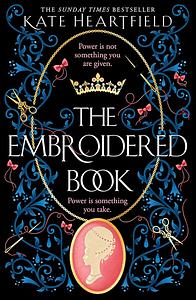Take a photo of a barcode or cover
it was ok, basically just a textbook however with some magical elements sprinkled throughout to make it more interesting and more fictional. was wayyyyy too long, some really unnecessary parts that were included for what felt like no reason
dark
mysterious
tense
medium-paced
Plot or Character Driven:
Plot
Strong character development:
Yes
Loveable characters:
Complicated
Diverse cast of characters:
Yes
Flaws of characters a main focus:
Yes
This book completely surprised me, but I loved it- the use of fantasy elements within the historical fiction was brilliant and worked so well for me.
I just learned more about the Hapsburgs, and in particular, Emperor Joseph, Leopold, Queen Marie Antoinette, and Charlotte of Naples (Weirdly, I hardly think of Italy at all in relation to the French & American revolution nor about how the eruptions of volcanoes literally toppled governmental systems) by reading this book then I did in US high school history classes.
Wow. I was very glad for the cast of characters in the front of the book as warning ,although Heartfield does an amazing job of developing the myriad advisors, friends, and magical colleagues of Charlotte and Antoinette just enough to keep them separate. (although near the end I did have to remind myself which sister had which main advisor and main adversary). Luckily the French names and Italian names helped alot!
So Charlotte and Antoine are close sisters sent away by their mother the Empress to marry Bourbons in France and Naples so as to cement power. It's fairly brutal. Both girls find ways of preserving their sanity and influence via both friendships, and an elemental spell-based magic their nanny left to them via a book.
They soon find out that there is an official order (run by men of course) who hunt down and often kill "rogue" practitioners of magic.
This magic is closely woven into historical events (including the famous Marie Antoinette necklace affair, so cool!) around the revolutionary wars.
This system of magic is very, very cool and impactful on their characters in a deeply interwoven way because it requires sacrifice-- often that of a particular kind of memory or hope. This over time really creates isolation and doubt...like when Antoinette sacrifices her love for a good friend, she still acts like she values her, but all emotional weight is gone.
Or when Charlotte makes the mistake of giving a list of council members to her political enemy Rohan and he mocks her for giving her a second list-- because she's sacrificed the memory of that day for some other reason she can't remember.
Events do unravel as modern folks know they must according to commonly taught history, but it is an extremely compelling and edifying journey to the end.
Wow. I was very glad for the cast of characters in the front of the book as warning ,although Heartfield does an amazing job of developing the myriad advisors, friends, and magical colleagues of Charlotte and Antoinette just enough to keep them separate. (although near the end I did have to remind myself which sister had which main advisor and main adversary). Luckily the French names and Italian names helped alot!
So Charlotte and Antoine are close sisters sent away by their mother the Empress to marry Bourbons in France and Naples so as to cement power. It's fairly brutal. Both girls find ways of preserving their sanity and influence via both friendships, and an elemental spell-based magic their nanny left to them via a book.
They soon find out that there is an official order (run by men of course) who hunt down and often kill "rogue" practitioners of magic.
This magic is closely woven into historical events (including the famous Marie Antoinette necklace affair, so cool!) around the revolutionary wars.
This system of magic is very, very cool and impactful on their characters in a deeply interwoven way because it requires sacrifice-- often that of a particular kind of memory or hope. This over time really creates isolation and doubt...like when Antoinette sacrifices her love for a good friend, she still acts like she values her, but all emotional weight is gone.
Or when Charlotte makes the mistake of giving a list of council members to her political enemy Rohan and he mocks her for giving her a second list-- because she's sacrificed the memory of that day for some other reason she can't remember.
Events do unravel as modern folks know they must according to commonly taught history, but it is an extremely compelling and edifying journey to the end.
i read the audiobook of this and it was broadly quite good except the voice that the narrator did for maria antonia/marie antoinette which was grating and extremely squeaky.
i broadly agree with the consensus that this was well written but a bit rushed at the end (which is slightly astonishing considering the novel is nearly 700 pages and therefore should have no need to rush the climax and denouement). i struggled to distinguish some of the characters that had similar names and indistinct personalities, which made the events surrounding their characters (betrayal, seduction, death etc) less emotionally impactful.
i also don’t really get the point of retelling this story with magic? especially considering the ending. i also struggled with the actual practicality of the magical climax because i didn’t understand what was being done or how. i did really like the magical system though - i thought it was intriguing and worthwhile. i do however think that it would have suited any other story better than this historical reality, to which the author changed very little with this inclusion.
i broadly agree with the consensus that this was well written but a bit rushed at the end (which is slightly astonishing considering the novel is nearly 700 pages and therefore should have no need to rush the climax and denouement). i struggled to distinguish some of the characters that had similar names and indistinct personalities, which made the events surrounding their characters (betrayal, seduction, death etc) less emotionally impactful.
i also don’t really get the point of retelling this story with magic? especially considering the ending. i also struggled with the actual practicality of the magical climax because i didn’t understand what was being done or how. i did really like the magical system though - i thought it was intriguing and worthwhile. i do however think that it would have suited any other story better than this historical reality, to which the author changed very little with this inclusion.
Historical court machinations are not for me. The characters felt like they were at arm’s length as well.
A wonderful detailed and rich historical story with little magical twists. The strong, enduring sisterly relationship between Charlotte and Antoinette is the dominant and prevalent thread woven through the extensive tale. The embroidered book of magicis is an interesting, if not always necessary, device. The magic is a unique and thought provoking means to understand a turbulent history .
Phew! I’ve read many books that are much longer than this one, but I had to really push myself to finish The Embroidered Book. I’m unable to articulate a specific reason for the literary-induced lethargy that I suffered, because everything that I usually like was included in the story: strong heroines, well-written prose, magical elements, attention to historical details, etc. Nonetheless, my overall reading experience can best be classified as tedious. Warning: choosing to read this tome will seriously mess up your Goodreads Reading Challenge schedule!
"The only thing you can't trade for your heart's desire is your heart."
That quote from Lois McMaster Bujold kept running through my mind as I was reading this book. There, it applied to a man wrestling with how much to sacrifice for the life he wanted. Here it is even more literal. A fictional biography of Marie Antoinette and Maria Carolina of Naples, born sisters and archduchesses of Austria.
The premise is this: Magic exists, and the girls have stumbled on a spell book. They use the spells in it to try to protect the ones they love and make the world a better place. Laudable goals, indeed. However, the spells require sacrifices to work, of the old kind. Not "the blood of a goat" but more along the lines of "a happy memory," "the love you bear for a beloved individual," or even "the hope you bear for the future." This conceit makes it a fascinating lens through which to look at the politics and worldview at the time.
At the same time, it is a powerfully written novel that brings home how young these players on the world stage were, and how very much was expected of them (perfection, poise, politics, progeny) as well as just how twisted and controlled their lives were. These two sisters are best friends, but they have to hang out in secret because their mother believes they're a bad influence on each other. Their marriages are arranged with an eye to politics and their personal happiness and comfort is not considered. Both are shipped off at a shockingly (to us) young age to live with their husbands in their husbands' countries: France for Antonia (who becomes Marie Antoinette) and Naples for Charlotte (who becomes Maria Carolina). After which, their only communication is laborious (and far-from-foolproof) encrypted letters or stilted open letters that are open to interception, interpretation, and intrigue. From then on, each loves the other but is essentially on her own trying to make the best path forward that they can.
Charlotte explains it best when she says she needs to talk to Antonia, to see her actions reflected in Antonia's eyes, to decide what to do. Two people in a relationship need to be together, to talk, in order to save the relationship, or at least keep it the way it was. All relationships need that kind of calibration to keep in sync. Shunted off into separate countries, thrust into different circumstances and coincidences, each woman has to make the best decisions she can, and those decisions put them on opposite sides of a massive philosophical (and cultural) struggle.
It's all fiction, of course, but Heartfield does a phenomenal job of taking massive research about each woman (easily apparent to anyone who has read a couple of their biographies) and melding it into a coherent storyline, consistent with historical facts. It is beautiful and heartbreaking to read.
As the sisters face the challenges of keeping their loved ones safe in a rapidly evolving world, the questions of sacrifice, and who and what it is acceptable to sacrifice and for what ends, come starkly to the fore. The denouement is gracefully and wonderfully done, and the whole book was almost impossible to put down. I highly recommend it this thought-provoking, absorbing book.
That quote from Lois McMaster Bujold kept running through my mind as I was reading this book. There, it applied to a man wrestling with how much to sacrifice for the life he wanted. Here it is even more literal. A fictional biography of Marie Antoinette and Maria Carolina of Naples, born sisters and archduchesses of Austria.
The premise is this: Magic exists, and the girls have stumbled on a spell book. They use the spells in it to try to protect the ones they love and make the world a better place. Laudable goals, indeed. However, the spells require sacrifices to work, of the old kind. Not "the blood of a goat" but more along the lines of "a happy memory," "the love you bear for a beloved individual," or even "the hope you bear for the future." This conceit makes it a fascinating lens through which to look at the politics and worldview at the time.
At the same time, it is a powerfully written novel that brings home how young these players on the world stage were, and how very much was expected of them (perfection, poise, politics, progeny) as well as just how twisted and controlled their lives were. These two sisters are best friends, but they have to hang out in secret because their mother believes they're a bad influence on each other. Their marriages are arranged with an eye to politics and their personal happiness and comfort is not considered. Both are shipped off at a shockingly (to us) young age to live with their husbands in their husbands' countries: France for Antonia (who becomes Marie Antoinette) and Naples for Charlotte (who becomes Maria Carolina). After which, their only communication is laborious (and far-from-foolproof) encrypted letters or stilted open letters that are open to interception, interpretation, and intrigue. From then on, each loves the other but is essentially on her own trying to make the best path forward that they can.
Charlotte explains it best when she says she needs to talk to Antonia, to see her actions reflected in Antonia's eyes, to decide what to do. Two people in a relationship need to be together, to talk, in order to save the relationship, or at least keep it the way it was. All relationships need that kind of calibration to keep in sync. Shunted off into separate countries, thrust into different circumstances and coincidences, each woman has to make the best decisions she can, and those decisions put them on opposite sides of a massive philosophical (and cultural) struggle.
It's all fiction, of course, but Heartfield does a phenomenal job of taking massive research about each woman (easily apparent to anyone who has read a couple of their biographies) and melding it into a coherent storyline, consistent with historical facts. It is beautiful and heartbreaking to read.
As the sisters face the challenges of keeping their loved ones safe in a rapidly evolving world, the questions of sacrifice, and who and what it is acceptable to sacrifice and for what ends, come starkly to the fore. The denouement is gracefully and wonderfully done, and the whole book was almost impossible to put down. I highly recommend it this thought-provoking, absorbing book.
I ended 2021 with a bang because OMG this book was good. Thank you so much to harpervoyager and Netgalley for this e-ARC.
This story is set in 18th century Europe where the Austrian Habsburgs are spread around the continent under the lead of their mother and Empress Maria Theresa.
This story is set in 18th century Europe where the Austrian Habsburgs are spread around the continent under the lead of their mother and Empress Maria Theresa.




